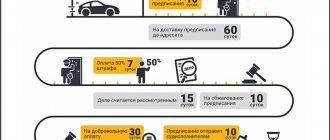In what case is a decision on an administrative violation made?
A decision on an administrative offense is made based on the results of consideration of the case by the internal affairs bodies, customs services, military commissariat, and court. It must be formed in accordance with the requirements of Article 29 of the Code of Administrative Offenses of the Russian Federation, otherwise it will be appealed in a certain manner. The appeal document is most often drawn up according to a sample that contains all the key points. A ruling is made only if sufficient evidence is provided to prove guilt. These are:
- Protocols from the scene.
- Explanatory notes for all participants in the event.
- Testimony of the injured party.
- Testimony of witnesses.
- Expert opinion on the case.
- Recording of technical means (video or photographic recording).
- Evidence.
- Other documents.
The decision is made immediately on the spot if the person involved does not deny guilt: this possibility is provided for by the provisions of the Code of Administrative Offenses. In this case, there is no need to draw up a protocol. This document can also be fully replaced by technical means operating in automatic mode.
The procedure for appealing the protocol and resolution of the traffic police
The procedure for appealing the protocol and resolution of the traffic police
It is necessary to distinguish a protocol from a resolution. The first thing a car owner needs to do is check which document was drawn up by the traffic police officer. Depending on this, the actions of the motorist will vary. Let's look at both of these cases in order.
Important! This article is about the actions of a motorist after a protocol or resolution has already been drawn up (issued), and not about the procedure for protecting one’s rights in the process of drawing up documents.
The procedure for appealing an illegal protocol
So the protocol was drawn up. What's next?
First you need to decide which body will consider the case. If a motorist faces deprivation of a driver's license or arrest, the case will be heard in court. If a fine is threatened, then the case will be considered by the traffic police department (this will in no way deprive the motorist of the opportunity to file a complaint against the decision in court). Which body will consider your case can also be clarified in Chapter 23 of the Code of the Russian Federation on Administrative Offences. We will look at the general provisions of the law that are relevant to the consideration of the case in both of these bodies.
In order to cancel an illegal protocol, you must submit evidence confirming its illegality to the traffic police or the court. This evidence does not need to be presented if it is already on file. For example, this evidence may be the same protocol from the content itself, which implies that it was obtained with violations. Such evidence may also be other documents (schemes, contracts, locations, certificates, printouts) or materials (video or audio). Also, do not forget about the provisions of Article 1.5 of the Code of Administrative Offenses of the Russian Federation, which obliges the traffic police officer to provide evidence of guilt, and on the contrary, exempts the motorist from providing such evidence. Thus, presenting evidence is a driver's right, not an obligation.
In order for a motorist to cancel the protocol, he must be summoned to consider the case (for analysis, to court). The law obliges to call the motorist to participate in the consideration of the case (Article 25.1 part 2 of the Code of Administrative Offenses of the Russian Federation). However, it is always recommended to take the initiative yourself and receive a summons about the date of the hearing. A “reinsured” motorist will avoid problems associated with possible failure to notify.
How a case of an administrative offense should be considered is written in detail in Chapter 29 of the Code of the Russian Federation on Administrative Offenses. Particularly important for a motorist is Article 29.7 of the Code of Administrative Offenses of the Russian Federation, which clearly states the algorithm of actions of a traffic police officer or a judge hearing a case. After all, violation of this procedure, if it entailed a violation of the rights of the motorist, is grounds for canceling the decision. This order is established by law - for good reason. It allows an objective examination of the case. The motorist must be attentive to the violations committed. These violations can lead to the fact that the driver is illegally found guilty of a violation that he did not commit. Every motorist should be able to protect himself from violations.
Attention! A motorist may file a petition to make an audio recording of the consideration of a case (discussion or court hearing). The right to make audio recordings is provided for in Part 3 of Article 24.3 of the Code of Administrative Offenses of the Russian Federation. If necessary, a dictaphone recording will be one of the evidence of violations.
Important! In accordance with Article 24.3 of the Code of Administrative Offences, a case of an administrative offense is considered in the open. Anyone can attend an open hearing of a traffic police case or a court hearing. If violations were committed during the consideration of the case, the listener will be able to confirm them in the future.
During the consideration of a case of an administrative offense, all evidence available in the case is examined, and other actions listed in Article 29.7 of the Code of Administrative Offenses of the Russian Federation are carried out. By exercising his rights granted in Article 25.1 of the Code of Administrative Offenses of the Russian Federation, the motorist protects his interests during the consideration of the case. He can give explanations, present evidence, make motions, use legal assistance, file challenges, and also exercise his other rights.
Based on the evidence available in the case, as well as with mandatory consideration of the provisions of the presumption of innocence of the motorist (Article 1.5 of the Code of Administrative Offenses), a decision is made to terminate the proceedings in the case or a decision to hold the motorist accountable. An acquittal order is issued in cases specified in the law (for example, if there are grounds listed in Article 24.5 and other articles of the Code of Administrative Offenses of the Russian Federation). It must be remembered that an indictment can always be appealed to a court or a higher court.
Thus, the procedure for appealing an illegal protocol is the process of a motorist protecting his rights during the consideration of a case of an administrative offense.
Grounds for complaint
An appeal against a protocol on an administrative offense is provided for within 10 calendar days from the date it enters into legal force. If the applicant missed the deadline for a good reason, the court reinstates it. This is an illness, serious injury, incapacity of a relative in need of constant care, fire, natural disaster or force majeure. Proof of the circumstances will need to be documented - this could be certificates from a hospital or other institution.
To file a claim with the court or higher authorities, there must be serious grounds. You can appeal a traffic police decision on an administrative violation in the following cases:
- The document contains an inconsistency in the pattern of the offense or a distorted interpretation of what is happening.
- During the medical examination, there was no video recording or witnesses were not involved.
- The inspector did not explain the rights and responsibilities of the participants in the accident and did not provide copies of the protocol.
- The classification of the offense was incorrectly determined.
- The document contains typos or was compiled later than the event occurred.
- In the blank lines when drawing up the protocol, additional information later appeared that did not correspond to reality.
It is important to know! A complaint against a decision in a case of an administrative offense of the State Traffic Safety Inspectorate is written in person or with the assistance of a lawyer. It must be submitted as quickly as possible so as not to violate the deadlines established by law. If the document is sent by mail, the stamp indicated on the dispatch envelope is considered the moment of submission.
Is it possible to appeal the traffic police protocol if I signed
A lot of violations may be discovered on the part of traffic police officers. Hundreds of drivers have encountered a situation where the offense was classified incorrectly. It is the data that is entered into the protocol that is especially often questioned. The inspector is obliged to explain all the rights and obligations to the citizen in whose name the protocol is issued. There may be a lot of errors in the document itself.
In our country there is no ideal behavior pattern on the road. There is a certain set of rules called traffic rules, which the driver must strictly follow. The list of rights and responsibilities of the driver on the road, as well as the forms of punishment that are provided for violations, are prescribed in the administrative code. In addition, these standards apply not only to civilians, but also to officials.
A protocol can only be issued for a committed violation of traffic rules. The protocol is entered regardless of the severity of the violation, whether it is a punishment for not fastening a seat belt or driving into the oncoming lane. The right to fill out the protocol form belongs only to an authorized traffic police officer.
Important! The only exceptions are violations that are recorded by a video recording device. In this case, the stage of drawing up the protocol will be skipped, and a resolution will be immediately issued in the name of the violator.
The reason for which the protocol was drawn up must be serious and have an evidence base. So, when speeding was recorded, radar readings are needed, if the driver was driving while drunk, a medical certificate is needed. In a situation with an accident, it is imperative to take into account the testimony of witnesses and witnesses.
Fine for not allowing a car with a special signal to pass. Find out how to cancel a decision on an administrative violation here.
Where to appeal a decision on an administrative offense, read the link:
If the accused does not agree with a certain punishment, he has the right to appeal the decision.
There are several ways to challenge protocol data:
- Refuse to sign documents. With this outcome, it is necessary that this fact be noted by the inspector in the protocol, in addition, this data must be recorded in the presence of two witnesses.
- Sign the document and enter additional information in the column called “Explanations.” In this paragraph, you can indicate all the information that, in your opinion, is not reflected reliably or was not provided at all.
Important! The detained driver is not required to sign the protocol. However, this fact does not in any way affect the decision. A decision will be issued regarding the incident by the investigation team, or the case will be sent to court.
The protocol itself is not subject to appeal; you can only appeal the issued decision, which was issued according to the protocol data.
The main question that interests the violator: is it possible to appeal the protocol if he signed the documents? Any lawyer will explain to you in detail, according to the Administrative Code, signing the protocol only confirms that the citizen was familiar with the data. No one forbids the driver to challenge the protocol data, present evidence, or apply for the recording of witness data. If the driver wishes to have his interests represented by a human rights activist when the offense is considered by the investigation team, then this information must be recorded in the protocol (column: “Explanations”).
Important! Before signing the protocol, you should sign it very carefully. Empty columns must be crossed out yourself to avoid the traffic police inspector adding false information.
Appeal algorithm
An appeal against a decision on an administrative offense will only be successful if the document was issued illegally. In other cases, this is a waste of time, since the court considers evidence of the offender’s innocence, and some must be significant, that is, presented in documentary form, in witness testimony or video recording from a camera. If the grounds for cancellation are minor, but present in large quantities, then the decision can, at best, be mitigated.
When drawing up a document yourself, you should use a sample complaint against a decision on an administrative violation. In this case, the risk of missing the most important thing is eliminated. It usually takes no more than half an hour to fill out. The document includes the following points:
- Name of the institution where the paper is sent.
- Personal information, contact information.
- Number of the resolution and full name of the official who signed it.
- The main provisions of the described offense and disagreement with them.
- Evidence of a person’s innocence with documents and registrar records attached.
- Demand to cancel the decision or reduce the punishment.
- Signature and date of compilation, list of attached documents.
It is important to know! You can challenge the fine by filing a petition with the higher authorities of the traffic police, but, as practice shows, the percentage of positive decisions on such appeals is very low.
Therefore, experts recommend filing a statement of claim with the court along with the claim so as not to waste time. Documents that will be required:
- Passport or identity document.
- Traffic police report, which reflects all events and behavior of the culprit.
- Resolution on the commission of an administrative offense.
- Evidence of innocence or abuse of process.
The period for appealing a decision on an administrative offense is 10 days. If during this period a person submits a claim, it will be considered by the authorized body. He has only 2 months for all actions related to the verification.
We are on Twitter:
Login Registration
Automotive news
Rules for the movement of heavy trucks in the automatic weight control zone have been adopted. The Federal Tax Service has approved the application form for the death or destruction of a vehicle. In Russia, it is forbidden to disembark children without a ticket from buses. A new sign 6.22 has been introduced in the traffic rules - “photo and video recording” Testing for alcohol dependence has been postponed for another year. The Ministry of Health has updated the requirements for completing car first-aid kits, the Ministry of Transport has approved the procedure and terms for storing diagnostic maintenance cards. Obtaining permission for international transport will now be done in a new way. You can now check your MTPL policy for authenticity online. The Central Bank has set new tariffs for MTPL.
/ Legal articles on the topic of automobile law / Adm. liability for traffic violations / How to appeal a traffic police protocol?
How to appeal a traffic police report?
Quite often, motorists turn to lawyers with a request to help them appeal the traffic police report drawn up on the fact of an administrative offense.
After hearing such an appeal, any competent lawyer will immediately explain to the citizen that the administrative protocol itself cannot be appealed, since it is not the final document in the case and it does not contain a decision on bringing to administrative responsibility.
The protocol on an administrative offense is an “interim” document in which a traffic police officer records the fact of an offense that, in the opinion of the police officer, took place. In simpler terms, a protocol drawn up by a traffic police officer is a preliminary “charge” that is brought against the driver under one or another article of the Code of Administrative Offenses of the Russian Federation. By itself, the protocol does not establish the guilt of the driver and does not put an end to the case, since whether the driver is guilty or not will be decided by the court or an official who considers the case on its merits and issues a final document - a resolution. Of course, in certain situations, decisions are made by inspectors immediately on the spot, following the drawing up of a protocol, but this does not change the essence - it is still not the protocol, but the decision that is subject to appeal.
This is important: it is not the protocol itself that is subject to appeal, but the final decision in the case of an administrative offense. At the same time, violations committed during the preparation of the protocol may become one of the key grounds for a favorable outcome of the case during its consideration, or for further appeal of an illegal decision
However, the above does not mean at all that the actions of the traffic police officers who drew up the administrative protocol can be appealed only after a decision has been made on the case. Not at all. Citizens are not limited in their right to complain about unlawful actions of employees and can do so at any time. This may be especially relevant in cases that are not considered immediately on the spot, but after some time in court. If there are obvious and gross violations related to the preparation of the protocol, the motorist has a good chance to approach the trial fully armed.
What should you pay attention to at the stage of drawing up the protocol?
The protocol is the key document in the case of an administrative offense, and therefore you need to start fighting for your rights already at the stage of its preparation. If in the process of drawing up a protocol you cannot influence a traffic police officer, for example, by convincing him that you are right, then the best tactic is to record everything to the maximum, in order to exclude in the future any possibility of making any changes to the protocol and other materials. .
Do not refuse to receive a copy of the protocol. It is quite possible that it will become your main weapon in the fight for your rights. Having received a copy of the protocol, you deprive unscrupulous employees of the opportunity to make any corrections to it. And don’t be afraid to put your signature in the line “I received a copy of the protocol.” The presence of your signature in the specified place only means that you received a copy of the protocol and nothing more. The only advice is to take your time and carefully look at where and for what exactly you are signing in the protocol.
If you do not consider yourself guilty, this should be recorded in the protocol. You can simply write “I do not agree with the protocol,” or you can briefly argue why you do not agree. If you want a more detailed explanation of the essence of the incident to be attached to the protocol, you can submit a corresponding request, and write the explanation in your own hand.
Do not hesitate to carefully read everything that is written in the protocol. In law, every word can have a big meaning!
What to do if the protocol was drawn up in violation of the law?
Seek legal assistance and, with the help of a competent lawyer, benefit from this in the process of considering the administrative case on its merits. The protocol on an administrative offense is a key document in the case and if it is drawn up with gross violations of the Code of Administrative Offenses of the Russian Federation, you can count on a favorable outcome of the case.
To obtain primary legal assistance on issues of appealing the actions of traffic police officers, you can contact the duty lawyers of our website using this convenient online form. Write your question, leave your contact details and they will definitely help you!
Where to complain?
In our opinion, in case of violations of the law by the traffic police officers who drew up the protocol, it would be most reasonable to file several complaints at once.
The first and main one is a complaint against a decision in an administrative case. If you do not appeal the decision, then all your other movements will, in fact, be meaningless, because the final document in the administrative case, which records your guilt in committing an offense, will come into force. Drawing an analogy with criminal proceedings, complaining about an administrative protocol without appealing the decision itself is the same as complaining about an investigator who sent a criminal case to court, without challenging the verdict passed in this case.
In accordance with Art. 30.1 of the Code of Administrative Offenses of the Russian Federation, a decision in a case of an administrative offense made by a traffic police official can be appealed to a higher official, to a higher internal affairs body or to a district court, and made by a judge - only to a higher court.
The second complaint against the actions of traffic police officers should be sent to the prosecutor. At the same time, the complaint should pay attention not only to the essence of the offense, but also to other points that may indicate unlawful actions of employees.
Helpful advice: having extensive experience in practical jurisprudence, we strongly do not recommend that you write huge footcloth complaints. This is often the sin of citizens inexperienced in legal battles and novice lawyers, who naively expect that prosecutors and judges will carefully read their twenty-page opuses. Complaints must be concise and contain only those information and arguments that are essential
That's all, good luck on the roads!
“Rip-off” at a car service center - how not to fall for deception
Replacement of a driver's license through the MFC
traffic police protocol
8470
No comments yet. Yours will be the first!
Write a comment
New comments
Badyrgy → Removal and expungement of a criminal record under Art. 264.1 of the Criminal Code of the Russian Federation 21 hours ago
Convicted in 2014 of Part 1 of Article 264 of the Criminal Code of the Russian Federation with restriction of freedom and deprivation of rights for 1 year. How to expunge a criminal record? And where to go
Vladimir → Is it necessary to give way to a bus leaving the bus stop… 15 days ago
The rules state that the driver must give way to a bus departing from a stop within the city limits, but I drive at a speed of 60 km per hour at the main speed...
Automotive Lawyer → Deprivation of the right to drive under Art. 264 of the Criminal Code of the Russian Federation. About the most... 1 month ago
Hello. The period of criminal punishment in the form of deprivation of the right to drive runs, regardless of whether the vehicle is passed or not. The traffic police have been punished for enforcing this...
Evgeniy → Deprivation of the right to drive under Art. 264 of the Criminal Code of the Russian Federation. About the most... 1 month ago
Good evening! In 2014, he was convicted under Part 264 of the Criminal Code and served a real sentence of 2 years in a penal colony; the court also deprived him of his license for 3 years, after...
Automotive Lawyer → Deprivation of the right to drive under Art. 264 of the Criminal Code of the Russian Federation. About the most... 1 month ago
Hello. The terms of deprivation under the article of the Code of Administrative Offenses of the Russian Federation and under the article of the Criminal Code of the Russian Federation are not cumulative. Each term is calculated independently, i.e., independently of each other
Where to complain?
You can submit a completed complaint form to several authorities at once, provided that there is evidence of innocence. The decision on an administrative offense is sent to the following structures for review:
- Senior management of the traffic police department.
- District, regional, supreme court (except for arbitration).
- Executive body if the amount of the fine is disputed.
- Prosecutor's office.
The claim must be submitted before the expiration of 10 days from the date of issue of the decision.
Even after being refused by all institutions, the final word always remains with the court. In order not to waste time, send a complaint through your personal account of the official portal “Gosuslugi” online. But this method is suitable for registered users who have gone through the personal identification process or have issued an electronic signature.
The traffic police makes mistakes and loses
It is not clear why these irregularities occur. Either traffic police officers are not familiar with this procedure, or some of them deliberately violate it. After all, as a rule, lower courts rarely pay attention to these violations and deprive the accused drivers of their rights.
Let us remind you that traffic police officers can offer the driver to undergo an alcohol intoxication test on the spot if there is a suspicion of drunkenness. That is, invite him to breathe into a breathalyzer. But this procedure, as well as the procedure for removal from control, must be carried out either in the presence of two witnesses, or under video recording. The referral for a medical examination must also take place either in the presence of two witnesses or under video recording. In this case, the video recording must be attached to the case materials. However, this formality is not always observed.
So, for example, in January of this year in the city of Nerekhta, Kostroma region, a certain Malyshev was stopped. The inspectors decided that he was drunk and conducted an alcohol examination without witnesses, but with a video recording. However, the video recording was not attached to the case. Moreover, due to a malfunction of the video archive, the traffic police could not provide a file with this recording at the request of the court. However, the magistrate court found this violation to be insignificant. The district and regional courts agreed with him. However, the Supreme Court considered this a violation of the procedure provided for by the Code of Administrative Offences. And the protocols drawn up in this regard are unacceptable evidence. As a result, all decisions of the lower courts in this case were canceled and the proceedings in the case were terminated.
The inspectors in the Kaluga region who stopped the driver Bezrukov had a working camera and the recording from it was attached to the case file. The driver was charged with driving while intoxicated because, when testing for alcohol intoxication, the breathalyzer showed 0.17 mg of alcohol per liter of exhaled air.
Let us recall that the fact of the use of substances that cause alcoholic intoxication is determined by the presence of absolute ethyl alcohol in a concentration exceeding the possible total measurement error, namely 0.16 mg per liter of exhaled air.
If traffic cops violate the required procedures when drawing up a protocol, then the driver should be released from punishment in court
But according to the testimony of the inspector interrogated by the magistrate, Bezrukov was examined three times. At first the device showed 0.15 mg/l. After the second exhalation, the readings rose slightly. And after the third exhalation, the device showed 0.17 mg/l. It was these data that were included in the protocol. This whole picture of the driver being checked is confirmed by the DVR recording.
The Supreme Court indicated that a person is held accountable for those violations for which his guilt is established. At the same time, all doubts are interpreted in his favor. Therefore, inspectors had to use the reading that the device revealed the first time it was measured. And this is 0.15 mg/l. That is, less than the possible total measurement error. And if the inspectors are not satisfied with these testimonies and they still have suspicions that the driver is drunk, then they have the opportunity to offer him to undergo a medical examination. However, they did not take advantage of this opportunity.
Therefore, the Supreme Court overturned the decisions of the lower courts and terminated the proceedings.
It even happens when inspectors forget to determine who was driving the car. The head of one of the traffic police departments of the Primorsky Territory filed a complaint with the Supreme Court. The fact is that administrative proceedings were initiated against a certain citizen Poberezhny for refusing a medical examination. The court of first instance deprived him of his rights for a year and a half and imposed a fine of 30 thousand rubles. However, the appeal court overturned this decision. The cassation court also supported the cancellation.
The fact is that, according to witness testimony, Poberezhny was not driving the car. Moreover, the inspectors themselves testified in court that no one got out of the car, and Poberezhny opened the window from the rear passenger seat.
The head of the traffic police insisted that the witnesses were interested parties because they were close friends of the accused. However, there is no evidence in the case that it was he who was driving. It is also impossible to determine who was driving the car using video footage. Therefore, the Supreme Court upheld the decisions of the appeal and cassation instances, and the complaint of the head of the traffic police was not satisfied.
Sometimes the court office itself helps to avoid punishment for driving while intoxicated. For example, at one point, in the notice of a court hearing, they forgot to indicate the date and time of its holding. However, the trial still took place in the absence of the accused. And he was given a punishment. However, the appellate court, on the basis that the defendant was not properly notified of the time of the trial, overturned the lower court's decision. But the case was dismissed due to the expiration of the statute of limitations.










